“Electronic media” or what threatens for posting negative information about the company?
In connection with the rapid development of electronic formats for providing and transmitting information, a huge number of questions arise: what is all of this about the media? What are the consequences of posting inaccurate information on your blog? What is inaccurate information?
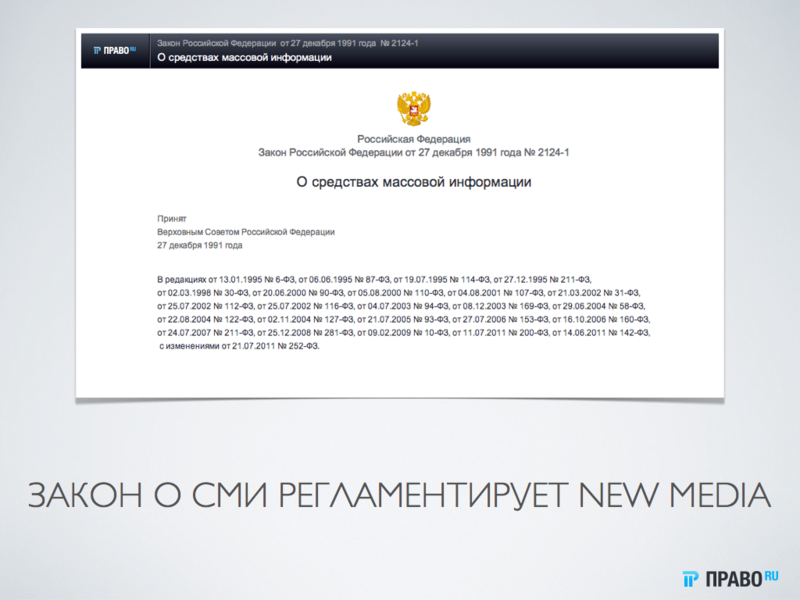
Let's start with the definition of electronic media. According to the Law “ On Mass Media ”, which regulates the search, receipt, production and distribution of mass information:
“A network publication is a website on the Internet information and telecommunications network, registered as a mass media in accordance with this Law.”
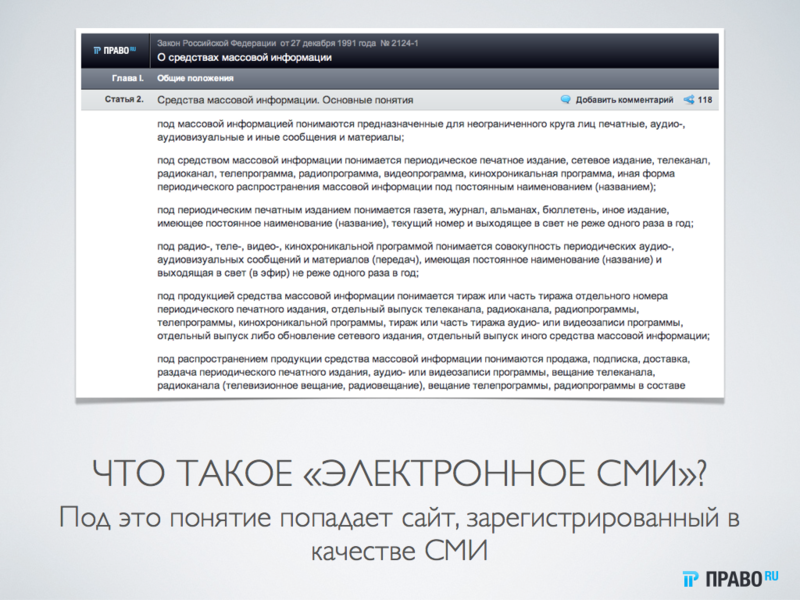
This interpretation appeared in Art. 2 of the Law only in 2011. It follows from it that personal blogs, LJ, forums and other information platforms without this registration are not a mass medium.

The rights and obligations of the site as a network publication arise from the moment of receiving registration of the media. And from that moment on, the site’s activities are regulated by the Law on Mass Media, as well as the Code of Administrative Offenses and the Civil Code of the Russian Federation . Actions blogger governed by the Administrative Code and the Civil Code.
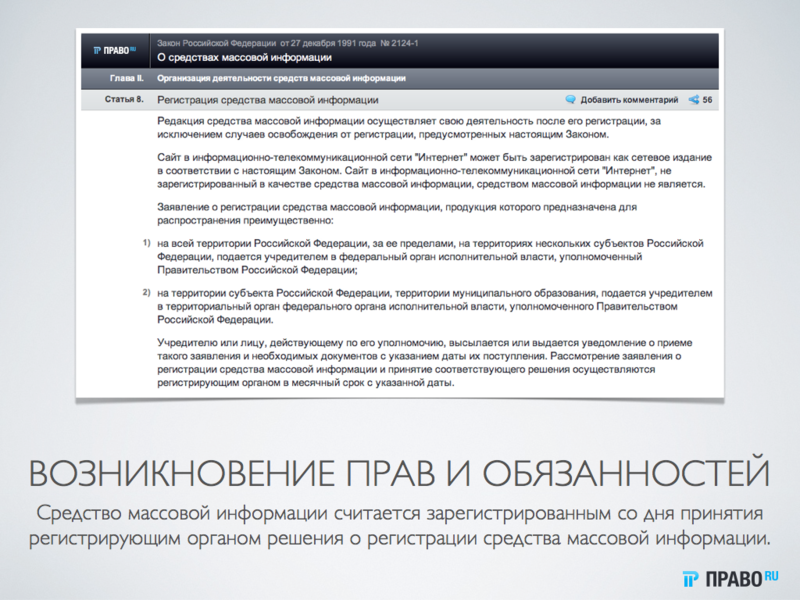
')
First you need to understand that the common information of this kind is classified into:
- defamation - an explanation of the term is contained in Art. 5.60 Administrative Code
- information discrediting the honor and dignity or business reputation ( Article 152 of the Civil Code of the Russian Federation).
There is still a value judgment . In order to fall under this definition, the statement must contain such momentum as "I think", "In my opinion" and so on. And most importantly, the statement should not state the fact, i.e. “I believe that the bank so illegally raised the loan rates” is not a value judgment.

If negative information is contained in a blog or forum, it is rather difficult to prevent its spread, if only because everything happens very quickly on the Internet. You also need to take into account that a blogger, if his post has scored a certain number of views and "likes", will protect its rights.
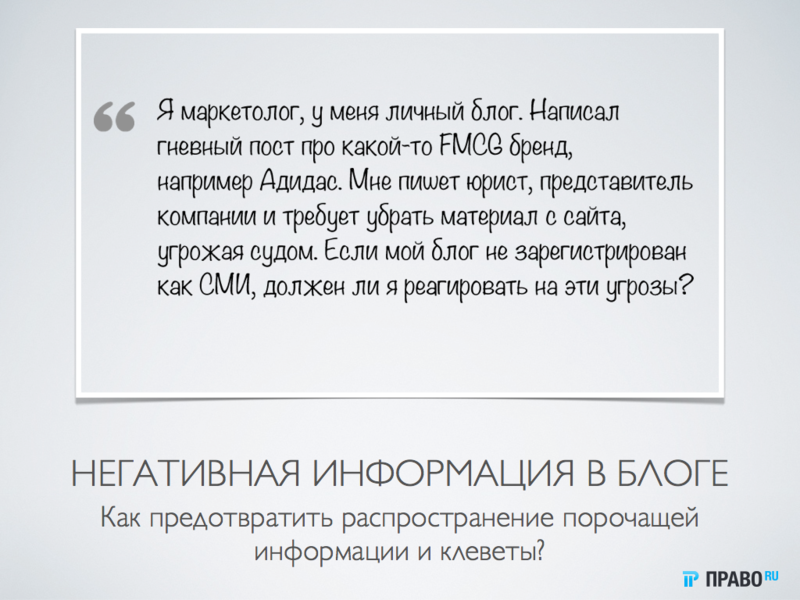
If a negative review is posted in the media, and it is not true and denigrates the honor, dignity or business reputation, then according to Art. 43 of the Law you have the right to demand refutation. In Art. 44 shows the order of its publication.
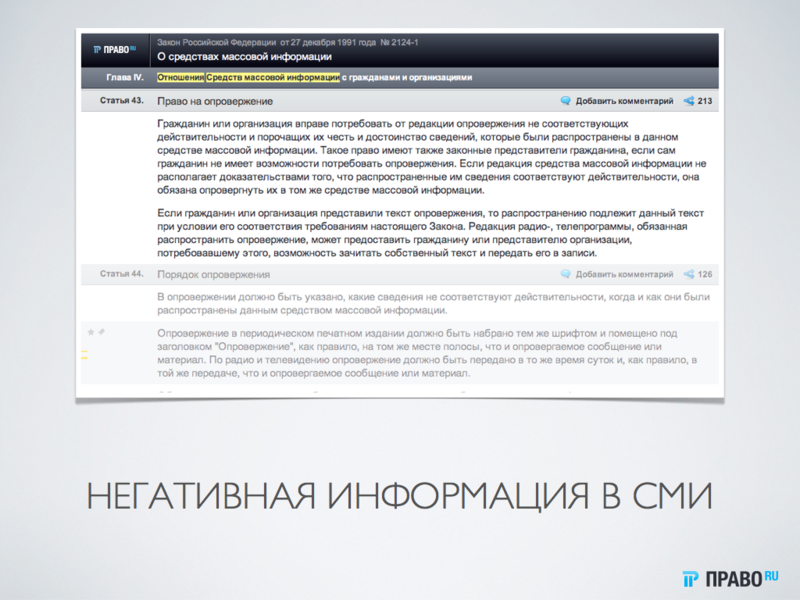
If you want a blogger or a journalist (editorial) to remove a negative review, first you need to write in writing with an indication of a text that is not true, defames honor, dignity or business reputation, and on the basis of art. 152 of the Civil Code of the Russian Federation must be removed. Here you need to hope for the good faith of the author. If he refuses to go to your meeting, and you are ready to go to court, then the same claim must be indicated in the statement of claim. The court will have to prove that:

It will be suing the media in an arbitration court, with bloggers in courts of general jurisdiction. However, disputes about the protection of business reputation related to business activities are considered only in arbitration courts.
Important: if the information published in the media defames reputation, but is true, then in accordance with paragraph 3 of Art. 152 of the Civil Code of the Russian Federation, you have the right to respond in the same media.
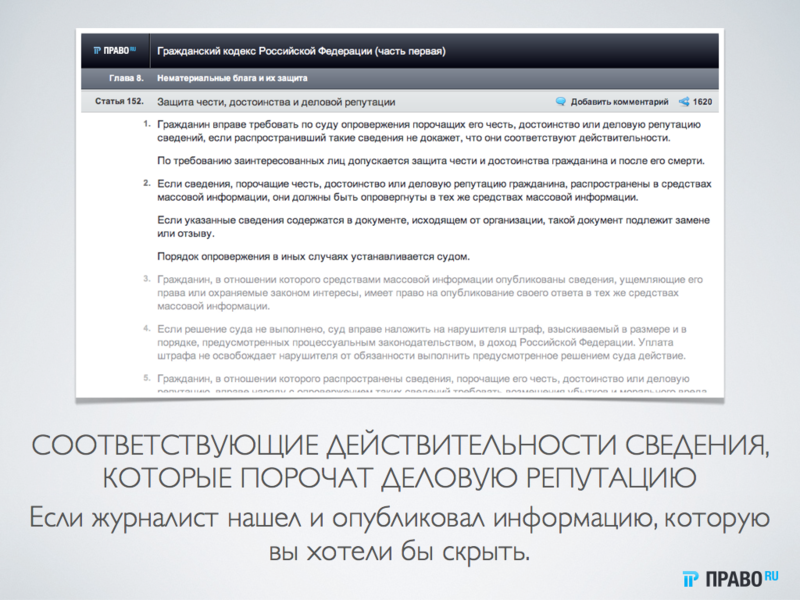
According to Art. 57 of the Law, if a blogger or journalist literally copied information from another source and posted it on his blog / publication. In this case, the author must indicate the source from which he copied the information.
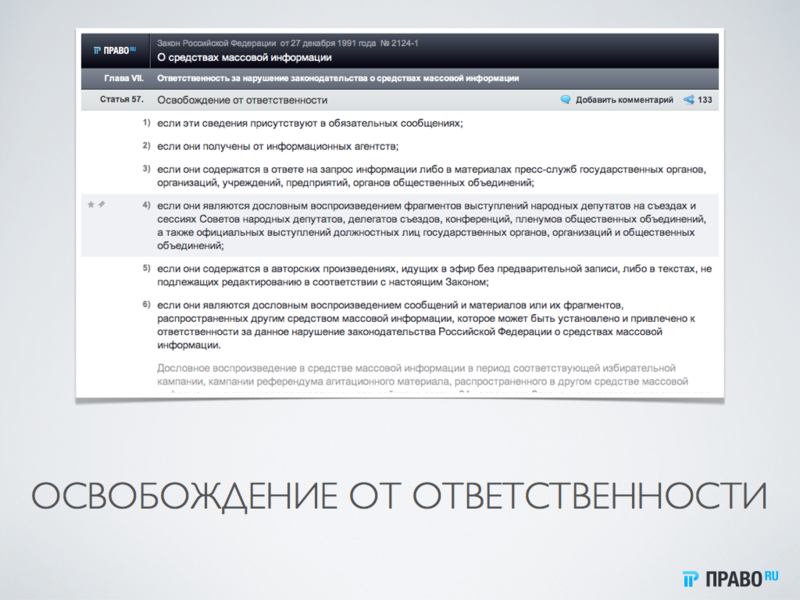
Also, if information discrediting honor, dignity or business reputation is contained in the comments left by site visitors, then according to paragraph 23 of the Resolution of the Plenum of the Supreme Court, the author of the material is not responsible for the opinions of others.

If you have questions, we will be happy to answer!
Today we will try to clarify the situation and answer the most frequently asked questions, namely: what is the difference between a personal blog and the site of the publication, and how are the actions of editors and authors of posts regulated.

Let's start with the definition of electronic media. According to the Law “ On Mass Media ”, which regulates the search, receipt, production and distribution of mass information:
“A network publication is a website on the Internet information and telecommunications network, registered as a mass media in accordance with this Law.”

This interpretation appeared in Art. 2 of the Law only in 2011. It follows from it that personal blogs, LJ, forums and other information platforms without this registration are not a mass medium.

The rights and obligations of the site as a network publication arise from the moment of receiving registration of the media. And from that moment on, the site’s activities are regulated by the Law on Mass Media, as well as the Code of Administrative Offenses and the Civil Code of the Russian Federation . Actions blogger governed by the Administrative Code and the Civil Code.

So, what to do if inaccurate information is posted that tarnishes the business reputation of your company, employees or you personally?
')
First you need to understand that the common information of this kind is classified into:
- defamation - an explanation of the term is contained in Art. 5.60 Administrative Code
- information discrediting the honor and dignity or business reputation ( Article 152 of the Civil Code of the Russian Federation).
There is still a value judgment . In order to fall under this definition, the statement must contain such momentum as "I think", "In my opinion" and so on. And most importantly, the statement should not state the fact, i.e. “I believe that the bank so illegally raised the loan rates” is not a value judgment.

If negative information is contained in a blog or forum, it is rather difficult to prevent its spread, if only because everything happens very quickly on the Internet. You also need to take into account that a blogger, if his post has scored a certain number of views and "likes", will protect its rights.

If a negative review is posted in the media, and it is not true and denigrates the honor, dignity or business reputation, then according to Art. 43 of the Law you have the right to demand refutation. In Art. 44 shows the order of its publication.

If you want a blogger or a journalist (editorial) to remove a negative review, first you need to write in writing with an indication of a text that is not true, defames honor, dignity or business reputation, and on the basis of art. 152 of the Civil Code of the Russian Federation must be removed. Here you need to hope for the good faith of the author. If he refuses to go to your meeting, and you are ready to go to court, then the same claim must be indicated in the statement of claim. The court will have to prove that:

It will be suing the media in an arbitration court, with bloggers in courts of general jurisdiction. However, disputes about the protection of business reputation related to business activities are considered only in arbitration courts.
Important: if the information published in the media defames reputation, but is true, then in accordance with paragraph 3 of Art. 152 of the Civil Code of the Russian Federation, you have the right to respond in the same media.

In which case bring to justice fail?
According to Art. 57 of the Law, if a blogger or journalist literally copied information from another source and posted it on his blog / publication. In this case, the author must indicate the source from which he copied the information.

Also, if information discrediting honor, dignity or business reputation is contained in the comments left by site visitors, then according to paragraph 23 of the Resolution of the Plenum of the Supreme Court, the author of the material is not responsible for the opinions of others.

If you have questions, we will be happy to answer!
Source: https://habr.com/ru/post/144961/
All Articles